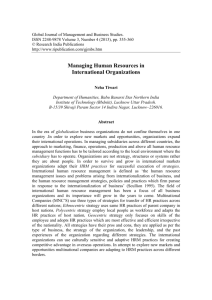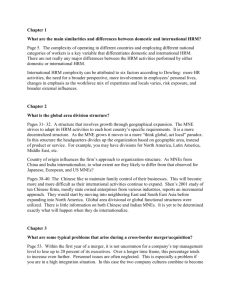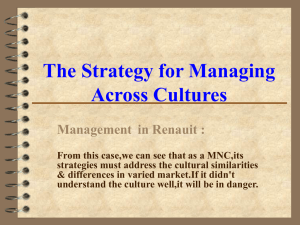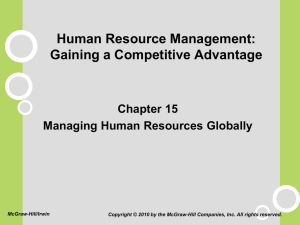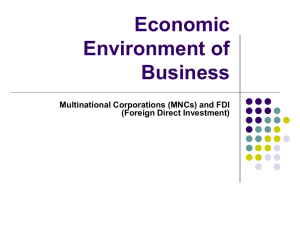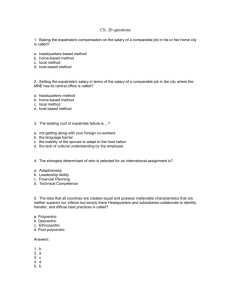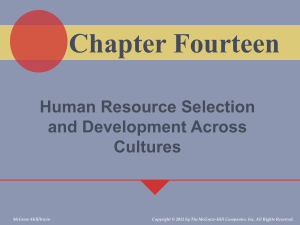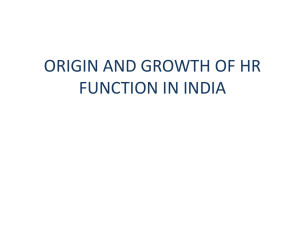Chapter 2 International Human Resource Management
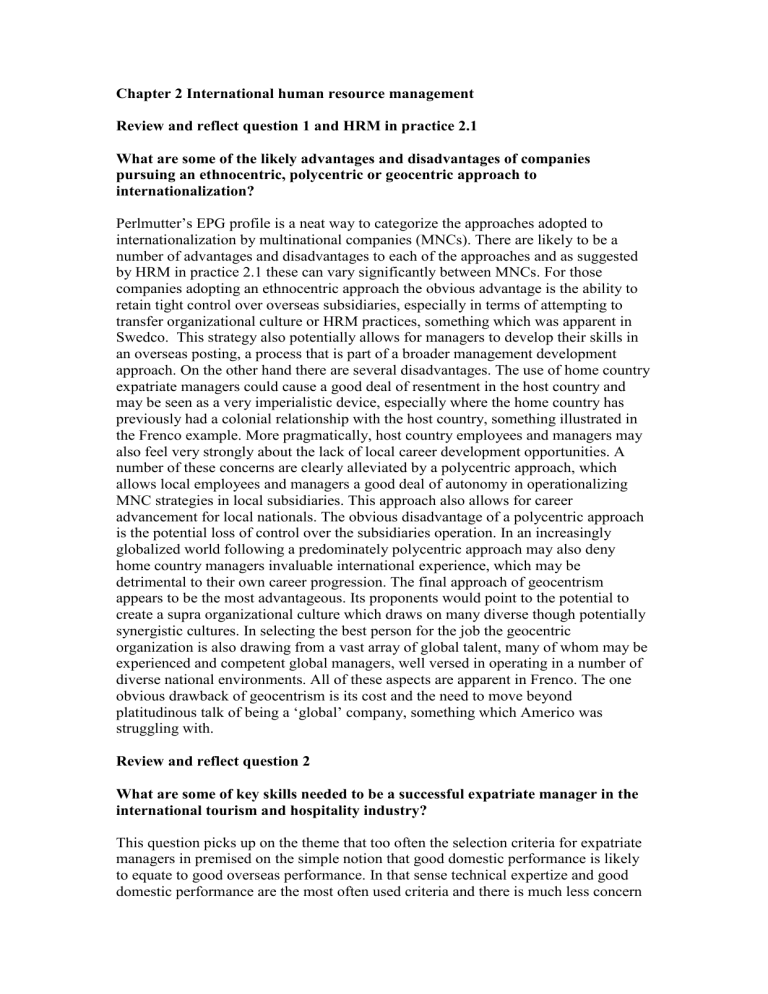
Chapter 2 International human resource management
Review and reflect question 1 and HRM in practice 2.1
What are some of the likely advantages and disadvantages of companies pursuing an ethnocentric, polycentric or geocentric approach to internationalization?
Perlmutter’s EPG profile is a neat way to categorize the approaches adopted to internationalization by multinational companies (MNCs). There are likely to be a number of advantages and disadvantages to each of the approaches and as suggested by HRM in practice 2.1 these can vary significantly between MNCs. For those companies adopting an ethnocentric approach the obvious advantage is the ability to retain tight control over overseas subsidiaries, especially in terms of attempting to transfer organizational culture or HRM practices, something which was apparent in
Swedco. This strategy also potentially allows for managers to develop their skills in an overseas posting, a process that is part of a broader management development approach. On the other hand there are several disadvantages. The use of home country expatriate managers could cause a good deal of resentment in the host country and may be seen as a very imperialistic device, especially where the home country has previously had a colonial relationship with the host country, something illustrated in the Frenco example. More pragmatically, host country employees and managers may also feel very strongly about the lack of local career development opportunities. A number of these concerns are clearly alleviated by a polycentric approach, which allows local employees and managers a good deal of autonomy in operationalizing
MNC strategies in local subsidiaries. This approach also allows for career advancement for local nationals. The obvious disadvantage of a polycentric approach is the potential loss of control over the subsidiaries operation. In an increasingly globalized world following a predominately polycentric approach may also deny home country managers invaluable international experience, which may be detrimental to their own career progression. The final approach of geocentrism appears to be the most advantageous. Its proponents would point to the potential to create a supra organizational culture which draws on many diverse though potentially synergistic cultures. In selecting the best person for the job the geocentric organization is also drawing from a vast array of global talent, many of whom may be experienced and competent global managers, well versed in operating in a number of diverse national environments. All of these aspects are apparent in Frenco. The one obvious drawback of geocentrism is its cost and the need to move beyond platitudinous talk of being a ‘global’ company, something which Americo was struggling with.
Review and reflect question 2
What are some of key skills needed to be a successful expatriate manager in the international tourism and hospitality industry?
This question picks up on the theme that too often the selection criteria for expatriate managers in premised on the simple notion that good domestic performance is likely to equate to good overseas performance. In that sense technical expertize and good domestic performance are the most often used criteria and there is much less concern
with issues such as language skills and international adaptability. Yet it is those things which are suggested as being key if the expatriate is going to have a positive experience. It would seem sensible then in selecting an expatriate manager for organizations to also take account of the psychological, mental and emotional capabilities of a manager and their dependants, to decide whether they will be able to adjust to their new surroundings. Consequently, selection should not be based solely on technical competence. Rather, organizations should attempt to ascertain whether individuals have certain other traits or characteristics to ensure a successful experience. In that sense, successful expatriate managers are likely to have an active desire to adjust to living in the local culture. They will also have sufficient emotional maturity to tolerate ambiguity and uncertainty. Being adaptable and learning from experience in a flexible manner, which is also sensitive to local cultures, is also crucial. This should allow the expatriate to judge the local culture within its own particular context. In that sense there are no ‘right’ or ‘wrong’ cultures, merely different cultures and the expatriate should aim to refrain from being too judgemental.
Lastly, the expatriate should perceive the experience as not only a major part of their career development but also a significant opportunity for personal growth.
Review and reflect question 3 and HRM in practice 2.2
Does the American dominance of the globalization process mean that we are all increasingly ‘Americanized’?
At times it might seem that we are bombarded with lots of ‘izations’, with
Americanization, taking place alongside other terms such as globalization,
Disneyization and Mcdonaldization. These various izations are attempts to offer a comprehensive view of what is happening in modern society, particularly at a global level. In many respects the answer to the question would be, it depends on your world view! Thus although many people may well find themselves consuming American products, they may do so in a relatively unconscious manner and not really think about any related cultural baggage. What HRM in practice 2.2 points to is that the question may also be very contingent on time and place. In that sense there is a need to place Americanization within a broader historical context, which is what HRM in practice 2.2 aims to do. Equally, institutions such as Disney and McDonald’s may simply be seen at one level as theme park or entertainment company or fast food vendor; or much more in terms of representing ‘Americaness’, being either a benign representatives of American capitalism or the worst excesses of American culture imperialism.
Review and reflect question 4
What are some of potential challenges facing tourism and hospitality MNCs in attempting to transfer their HRM practices across national boundaries?
At the heart of this question lies the recognition that there are likely to be a number of challenges facing a MNC which attempts to transfer their HRM practices overseas. As the text suggests many of these will be due to legislative constraints and others more concerned with cultural blockages. Thus, MNCs may view the issue of whether they need to conform to local circumstances in a number of ways. The first is what is considered ‘acceptable’, where the MNC will make a judgement as to how certain
policies or practices may be perceived; for example the use of performance related pay may not be appropriate in all countries. Second, there is the legalistic notion of what is ‘legitimate’, where MNCs have to yield and comply with local statutes; for example, does the organization have to pay overtime for work on Saturday and
Sunday? The final element is what may be ‘feasible’. This again involves the MNC making a qualitative judgement as to the operationalization of certain policies or practices; for example, in a society which is hierarchal, authoritarian and paternalistic, can the organization empower the workforce to make workplace decisions in order to facilitate their quality strategy? Arguably the notions of acceptability and feasibility exemplify a culturalist view of MNC adaptation, whilst the MNCs rationale for seeking legitimacy is more likely to be driven by a need for legislative compliance with institutional arrangements. It is the combination of these aspects then which will determine what the ‘permissiveness’ or ‘permeability’ of a host country’s institutional and cultural framework, such that certain host countries will be more open to the transfer of the MNCs home country policies and practices than others.
